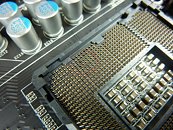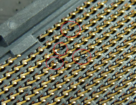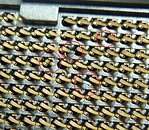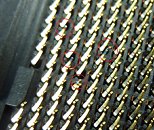Monday, January 17th 2011

Socket Pin Burnout Returns to Haunt LGA1155?
Last year, credible reports of a design defect with LGA1156 sockets made by a certain component manufacturer in particular, made headlines. Reviewers found that extreme overclocking using increase voltages, in test cases, caused certain pins of the socket to burn out, damaging both the board and processor. The defect was found to be caused by shorting between the pins and the socket causing tiny electrical arcs. Motherboard reviewer from TechReaction.net discovered that his Gigabyte GA-P67A-UD4 and GA-P67A-UD7 samples showed signs of socket burn. The publication is yet to receive a reply from the board manufacturer.
LGA1155 and LGA1156 are very similar in physical pin layout, chip package, and retention clips, although the pin-maps are significantly different. TechReaction comments that while only "extreme conditions" cause such pin burnouts, 24/7-stable overclocked settings could, over a period of time, create similar conditions. Only time, and extensive testing will reveal if burnouts are a cause for concern to enthusiasts.
Source:
TechReaction
LGA1155 and LGA1156 are very similar in physical pin layout, chip package, and retention clips, although the pin-maps are significantly different. TechReaction comments that while only "extreme conditions" cause such pin burnouts, 24/7-stable overclocked settings could, over a period of time, create similar conditions. Only time, and extensive testing will reveal if burnouts are a cause for concern to enthusiasts.




65 Comments on Socket Pin Burnout Returns to Haunt LGA1155?
And it's still only been shown on 2 individual boards this time around, not even 2 model lines, just 2 boards some guy had. We don't even know if it's legit burnout.
If they were posted with the same amount of facts as this was, they deserved that initial skepticism.
I repeat, the board came from Gigabyte with burnt pins.
Take it from me, always look into your board's specs when you are going to overclock, and more importantly, push voltage. I had a Biostar board (same model I'm using now, it got RMA'd) blow up and kill my 9800GT I had at the time when I tried to overclock/overvolt a Phenom 9500. The P9500 is already at 95w stock, and my board is only rated to support up to 95w processors. That sucked, but it was my fault for not paying attention, but I'm much the wiser about such things now.
It doesn't surprise me that these pins would burn out, especially when overclocked. Fitting 1155 pins into such a small space... those pins got to be awful thin.
To be honest I think that may just be the reviewer's fault or possibly just an unlucky board from GB. My UD4 didn't look like that, and so far so good. Feel like I'm a guinea pig now :ohwell:
Ya but because they were sample boards i'm guessing Gigabyte sent a couple of boards they were using and testing with and didnt realise the socket was burnt. I doubt a new board would have burnt sockets. Haha looks bad for Gigabyte though.
when intel change the pin from the processor to the socket, any fault like that is possible, remember how many pins on the socket, any small thing err on manufacture or handling would give result like that
Personally i dislike the pins being on the motherboard but that's mainly as my CPU's usually cost less than the board so that way around if a pin gets damaged it is the more costly replacement.
I'd haver a guess that the cpu overheated as well.
though i really do preser the pins on the mobo rather than the cpu, so many bent pins on cpus over the years and nada since I went to intel's lga style. So while I had an all too easy time beding a cpu pin while trying to be careful I've never bent one on a mobo even while not being careful.
And typically my mobo's are cheaper than my cpu. It's just more stuff to remove when a mobo burns out but that's no biggie.
1.) We do not know that he received the board this way from Gigabyte. He simply states that "upon arrival" there were burnt pins. However, he could have recieved it from another reviewer that tested it first, and the reviewer screwed up the pins. I know that when you review parts, they don't always come directly from the manufacturer. The manufacturer sends out the part to one person for review, then tells the reviewer where to send it when they are done.
2.) The reviewer posting about the problem has no idea what voltage was used, because he didn't burn the pins.
Now, as for my own observations from the pictures, it seems at least one of the pins is actually broken off. So my guess would be that one of the previous reviewers were a little rough with removing and inserting the processor, and broke a few pins. This was still enough to make contact, but caused the arcing situation. Of course there is the other pin that isn't broken but is still burnt, but that can be caused by the extra stress of more power going through that one pin because the others are failing.